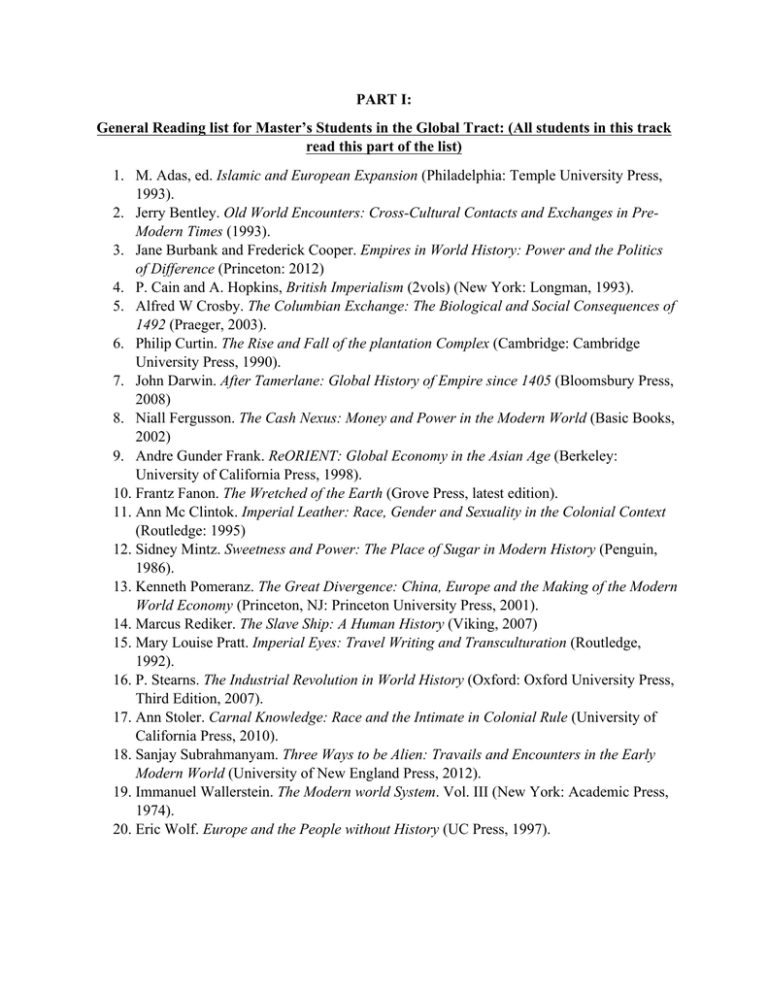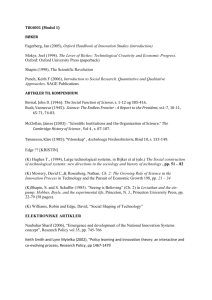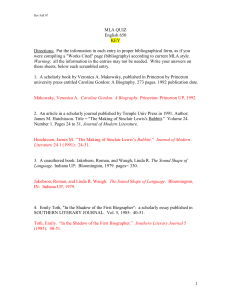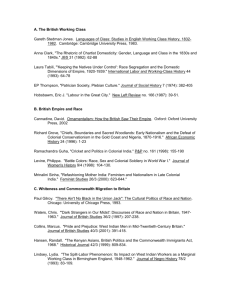PART I: read this part of the list)
advertisement

PART I: General Reading list for Master’s Students in the Global Tract: (All students in this track read this part of the list) 1. M. Adas, ed. Islamic and European Expansion (Philadelphia: Temple University Press, 1993). 2. Jerry Bentley. Old World Encounters: Cross-Cultural Contacts and Exchanges in PreModern Times (1993). 3. Jane Burbank and Frederick Cooper. Empires in World History: Power and the Politics of Difference (Princeton: 2012) 4. P. Cain and A. Hopkins, British Imperialism (2vols) (New York: Longman, 1993). 5. Alfred W Crosby. The Columbian Exchange: The Biological and Social Consequences of 1492 (Praeger, 2003). 6. Philip Curtin. The Rise and Fall of the plantation Complex (Cambridge: Cambridge University Press, 1990). 7. John Darwin. After Tamerlane: Global History of Empire since 1405 (Bloomsbury Press, 2008) 8. Niall Fergusson. The Cash Nexus: Money and Power in the Modern World (Basic Books, 2002) 9. Andre Gunder Frank. ReORIENT: Global Economy in the Asian Age (Berkeley: University of California Press, 1998). 10. Frantz Fanon. The Wretched of the Earth (Grove Press, latest edition). 11. Ann Mc Clintok. Imperial Leather: Race, Gender and Sexuality in the Colonial Context (Routledge: 1995) 12. Sidney Mintz. Sweetness and Power: The Place of Sugar in Modern History (Penguin, 1986). 13. Kenneth Pomeranz. The Great Divergence: China, Europe and the Making of the Modern World Economy (Princeton, NJ: Princeton University Press, 2001). 14. Marcus Rediker. The Slave Ship: A Human History (Viking, 2007) 15. Mary Louise Pratt. Imperial Eyes: Travel Writing and Transculturation (Routledge, 1992). 16. P. Stearns. The Industrial Revolution in World History (Oxford: Oxford University Press, Third Edition, 2007). 17. Ann Stoler. Carnal Knowledge: Race and the Intimate in Colonial Rule (University of California Press, 2010). 18. Sanjay Subrahmanyam. Three Ways to be Alien: Travails and Encounters in the Early Modern World (University of New England Press, 2012). 19. Immanuel Wallerstein. The Modern world System. Vol. III (New York: Academic Press, 1974). 20. Eric Wolf. Europe and the People without History (UC Press, 1997). Part II Track-Specific Reading List (Student select from their specific track) A. MIDDLE EAST 1. 2. 3. 4. 5. 6. 7. William Cleveland, A History of The Modern Middle East (Westview Press, latest ed.) James Gelvin, The Arab Uprisings (Oxford: Oxford University Press, 2012). Toby Dodge, Inventing Iraq (New York: Columbia University Press, 2005). Rashid Khalidi, Resurrecting Empire (Boston: Beacon Press, 2004) Joseph A. Massad, Colonial Effects (NY: Columbia University Press, 2001) Priya Satya, Spies in Arabia (Oxford Univeristy Press, 2009) Tom Segev, One Palestine Complete: Jews and Arabs under the British Mandate (Picador, 2001). 8. Sarah Shields, Fezzes in the River (Oxford University Press, 2011) 9. Orit Bashkin, New Babylonians: A History of Jews in Modern Iraq (Stanford, 2012) 10. Michelle Campos, Ottoman Brothers (Stanford University, 2010). 11. Hasan Kayali, Arabs and Young Turks: Ottomanism, Arabism, and Islamism in the Ottoman Empire, 1908-1918 (California, 1997) 12. Ussama Makdisi, The Culture of Sectarianism (California, 2000) 13. Eve Troutt-Powell, A Different Shade of Colonialism (California, 2003) 14. Max Weiss, In the Shadow of Sectarianism (Harvard, 2010) 15. Elizabeth Thompson, Colonial Citizens (Columbia, 2000) 16. Nekki Keddi, Modern Iran: Roots and Results of Revolution (Yale University Press, 2003). 17. Orit Bashkin, The Other Iraq: Pluralism and Culture in Hashimite Iraq (Stanford, 2010). 18. James Gelvin, Divided Loyalties: Nationalism and Mass Politics in Syria at the Close of Empire (University of California Press, 1999). 19. Lisa Pollard, Nurturing the Nation: The Family Politics of Modernizing, Colonizing and Liberating Egypt, 1863-1923 (2004) 20. Beth Baron, The Orphan Scandal (Stanford, 2014) B. LATIN AMERICA General 1. Mark A. Burkholder and Lyman L. Johnson, Colonial Latin America. (8th ed. Oxford, 2012) 2. Thomas E. Skidmore and Peter Smith, Modern Latin America. (7th ed. Oxford, 2009). 3. Chasteen, John Charles. Born in Blood and Fire: A Concise History of Latin America. (3rd ed. W. W. Norton and Company, 2011.) 4. Higman, B. W. A Concise History of the Caribbean, (1st ed. Cambridge University Press, 2010.) 5. Woodward, Ralph Lee. Central America: A Nation Divided. (3rd ed. Oxford, 1999.) 6. Skidmore, Thomas. Brazil: Five Centuries of Change. (Oxford, 1999). Colonial Period 1. Restall, Matthew. Latin America in Colonial Times. (Cambridge University Press, 2011). 2. Stern, Steve J. Peru’s Indian Peoples and the Challenge of Spanish Conquest: Huamanga to 1640. (Wisconsin, 1982). 3. Cope, R. Douglas. The Limits of Racial Domination: Plebeian Society in Colonial Mexico, 1760-1720. (Wisconsin, 1994). 4. Johnson, Lyman, and Sonya Lipsett-Rivera, eds. The Faces of Honor: Sex, Shame, and Violence in Colonial Latin America. (New Mexico, 1998). 5. Walker, Charles F. Shaky Colonialism: The 1746 Earthquake-Tsunami in Lima, Peru, and Its Long Aftermath. (Duke University Press, 2008). 6. Beezley, William H., Cheryl English Martin and William E. French (ed). Rituals of Rule, Rituals of Resistance: Public Celebrations and Popular Culture in Mexico. (Scholarly Resources, Inc. 1994). 7. Bauer, Arnold J. Goods, Power, History. Latin America’s Material Culture. (Cambridge University Press, 2001). 8. Restall, Matthew. Seven Myths of the Spanish Conquest. (Oxford University Press, 2004). National Period 1. Chasten, John Charles. Americanos. Latin America’s Struggle for Independence. (Oxford University Press, 2009). 2. Beezley, William H. and Linda Curcio-Nagy (ed.). Latin American Popular Culture Since Independence. An Introduction. (Rowman and Littlefield Publishers, 2nd ed. 2011). 3. Lynch, John. Argentine Caudillo: Juan Manuel de Rosas. (Rowman and Littlefield Publishers, 2001). 4. Chambers, Sarah C. From Subjects to Citizens: Honor, Gender and Politics in Arequipa, Peru, 1780-1854. (Penn State University Press, 2011). 5. Andrews, George Reid. Afro-Latin America: 1800-2000. (Oxford, 2004). 6. Perez, Louis A., Jr. On Becoming Cuban: Identity, Nationality, and Culture. (Ecco, 2001). C. AFRICA General Reading 1. Robert Collins (ed.), Documents from the African Past (Princeton, NJ: Markus Wiener Publishers, 2001). 2. Basil Davidson, Africa in History, revised edition (New York: Touchstone, 1995). 3. Toyin, Falola, The Power of African Cultures (Rochester, NY: University of Rochester Press, 2008). 4. Martin Meredith, The Fate of Africa: A History of the Continent since Independence (United Kingdom: Simon & Schuster, 2011). 5. Catherine Coquery-Vidrovitch, African Women: A Modern History (Westview Press, 1997). 6. Susan Geiger, Nakanyike Musisi, Jean Allman, Women in African Colonial Histories (Bloomington, IN: Indiana University Press, 2002). 7. Kevin Shillington, History of Africa, 2nd ed. (New York: St. Martin’s Press, 1995). 8. Jomo Kenyatta, Facing Mount Kenya (New York: Vintage Books, 1962). Western Africa 1. Emmanuel K. Acheampong, Themes in West Africa’s History (Athens, OH: Ohio University Press, 2006) 2. Nwando Achebe, Farmers, Traders, Warriors, and Kings: Female Power and Authority in Northern Igboland, 1900-1960 (Portsmouth, NH: Heinemann, 2005). 3. A.G. Hopkins, An Economic History of West Africa (Columbia University Press, 1995) Eastern Africa 1. Robert Collins (ed.), Eastern African History: Text and Readings (Princeton, NJ: Markus Wiener Publishers, 1990). 2. Grace Bantebya Kyomuhendo and Marjorie Keniston McIntosh, Women, Work and Domestic Virtue in Uganda, 1900-2003 (James Currey, 2006) 3. Paul Bjerk, Building a Peaceful Nation: Julius Nyerere and the Establishment of Sovereignty in Tanzania, 1960-1964. (University of Rochester Press: New York, 2015). Central Africa 1. David Birmingham and Phyllis Martin (eds.), History of Central Africa: the Contemporary Years since 1960 (Longman, 1998). 2. Christine Saidi, Women’s Authority and Society in Early East-Central Africa (New York, University of Rochester Press, 2010). 3. Leo Zeilig, Lumumba: Africa’s Lost Leader, London: Haus Publishing, 2015) Southern Africa 1. Nelson Mandela, Long Walk to Freedom: the Autobiography of Nelson Mandela (New York: Hachette Book Group, 1997). 2. Amy McKenna, The History of Southern Africa (New York: Britannica Educational Publisher, 2011). 3. Colin Bundy, Short-Changed? South Africa Since Apartheid. (Athens: Ohio University Press, 2014). D. EAST ASIA General 1. Patricia Ebrey, Anne Walthall, and James Palais, East Asia: A Cultural Social, and Political History. (Wadsworth, 2009) China 1. 2. 3. 4. Mark Elvin. The Pattern of the Chinese Past. (Stanford University Press, 1973) F. W. Mote. Intellectual Foundations of China. (McGraw-Hill, 1989) Jonathan D. Spence. The Search for Modern China, (Norton, 1999) Paul A. Cohen, Discovering History in China: American Historical Writing on the Recent Chinese Past. (Columbia University Press, 1984) 5. Phlip Kuhn, Rebellion and Its Enemies in Late Imperial China: Militarization and Social Structure. (Harvard University Press, 1970) 6. Frederic Wakeman, Jr., Policing Shanghai, 1927-1937. (University of California Press, 1995) 7. Yeh Wen-Hsin, Provincial Passages: Culture, Space, and Origins of Chinese Communism. ( University of California Press, 1996) 8. Tony Saich and Hans van de Ben, New Perspectives on the Chinese Communist Revolution (M. E. Sharpe, 1995) 9. Lloyd E. Eastman, Seeds of Destruction: Nationalist China in War and Revolution, 19371949 (Stanford University Press, 1984) 10. Roderick MacFarquhar and Michael Schoenhals, Mao’s Last Revolution (Harvard University Press, 2008) Japan 1. Mikiso Hane, Pre-modern Japan: A Historical Survey. (Westview, 1991) 2. Jeffrey Mass & William Hauser, eds., The Bakufu in Japanese History. (Stanford University Press, 1985) 3. Mikiso Hane, Modern Japan, A Historical Survey. (Westview, 1992) 4. W. G. Beasley, The Meiji Restoration. (Stanford University Press, 1972) 5. Marius Jansen, ed., Changing Japanese Attitudes Toward Modernization (Princeton University Press, 1965) 6. Gordon Berger, Parties Out of Power in Japan, 1931-194I (Princeton University Press, 1977) Alan Tansman, ed., The Culture of Japanese Fascism. (Duke University Press, 2009) 7. Akira Iriye, Power and Culture: the Japanese-American War, 1941-1945. ( Harvard University Press, 1981) 8. John W. Dower, Embracing Defeat: Japan in the Wake of World War II. (Norton, 2000) 9. Richard Katz, Japan, the System that Soured: the Rise and Fall of the Japanese Economic Miracle (M. E. Sharpe, 1998)






